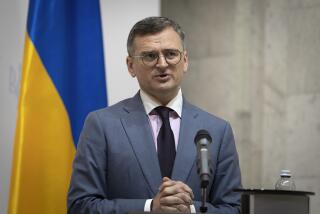Gorbachev Ally Pushed Reforms as Ukraine Leader : Party congress: A ‘Gorbachev generation’ politician is the new No. 2. He lists better food supplies, housing and health care among his priorities.
- Share via
MOSCOW — Vladimir A. Ivashko, elected Wednesday as the deputy general secretary of the Soviet Communist Party, is a man of the “Gorbachev generation”--a 58-year-old onetime economics professor who became a party official midway through his career.
Typical of the technocrats-turned-politicians in their late 50s on whom Gorbachev relies, Ivashko was trained as a mining engineer, taught economics and, after half a dozen party posts over 16 years, was elected the first secretary of the Ukrainian Communist Party last September and in June as the president of the Ukraine, the second-largest Soviet republic.
He immediately set out to accelerate the pace of perestroika and to distinguish himself from his conservative predecessor, Vladimir V. Shcherbitsky, who had been the last of the major political figures from the era of the late President Leonid I. Brezhnev.
“The people are very dissatisfied,” Ivashko told the Communist Party newspaper Pravda on his election as the Ukrainian party leader. “The tempo of renewal in various spheres of life in the republic . . . is clearly insufficient.”
He ticked off half a dozen priorities, including increased food supplies, better housing, more consumer goods and improved health care and environmental protection.
Gorbachev had traveled to Kiev, the Ukrainian capital, to install Ivashko as the party leader in person, declaring, “If perestroika falters in the Ukraine, it will falter throughout the entire country.”
Ivashko also sought to develop a working relationship between the party and Ukrainian nationalists, meeting regularly with them, legalizing the independent Ukrainian movement Rukh and supporting a series of measures to assert Ukrainian sovereignty within a new Soviet federation.
This brought him a measure of praise Wednesday from Mykhailo Horyn, a Rukh leader, who described him as “more a reformer than a die-hard Communist.”
But his election last month as the Ukrainian president was strongly protested by thousands of demonstrators who objected to his combining the party leadership with the presidency, and many nationalist deputies in the Ukrainian Parliament boycotted the vote.
“Ivashko out!” the demonstrators shouted at his presidential swearing-in. “Shame on Communists!”
Ivashko left his Ukrainian party post late last month in a move that may have been intended to defuse the protests--or to ensure a smooth succession when he came to Moscow as Gorbachev’s deputy. His rival in last September’s vote, Stanislav Gurenko, succeeded him as first secretary of the republic’s party.
“Mr. Ivashko’s decision means the end of his political career,” Rukh’s Horyn commented. “Only a man who does not think about his future can abandon the post of president of a 52-million-strong nation to become a deputy chairman of a party that is dying on its feet.”
One of those men called in Russian bezlichny, or “faceless,” for their grayness, Ivashko has had a career that, aside from minor confrontations with Ukrainian nationalists, has been without controversy.
The son of a carpenter, he was born in the Ukrainian town of Poltava in 1932, making him a member of the generation who know from their own experience the impact of the dictator Josef Stalin but who came of age politically during the relatively liberal era of Nikita S. Khrushchev.
Ivashko lived most of his life in Kharkov, graduating from the Kharkov Mining Institute in 1956, teaching and doing research at that and three other institutes for 17 years, earning a doctorate in economics, supervising higher education in the city for the party and then becoming a party secretary there.
Before his election as the Ukrainian first secretary, he had worked at party headquarters in Kiev for a year, as the party leader in Dnepropetrovsk, a notoriously conservative region, for a year and then as the Ukrainian party’s No. 2 leader for nine months. He had become a member of the party’s policy-making Central Committee in 1986 as one of a number of provincial leaders promoted by Gorbachev.
This rapid rise earned him the reputation of being one of Gorbachev’s proteges. In a front-page article in Pravda two years ago, he had called for faster social and economic reforms and for a struggle against bureaucracy, and with that he clearly became a member of the “Gorbachev generation.”
More to Read
Sign up for Essential California
The most important California stories and recommendations in your inbox every morning.
You may occasionally receive promotional content from the Los Angeles Times.









